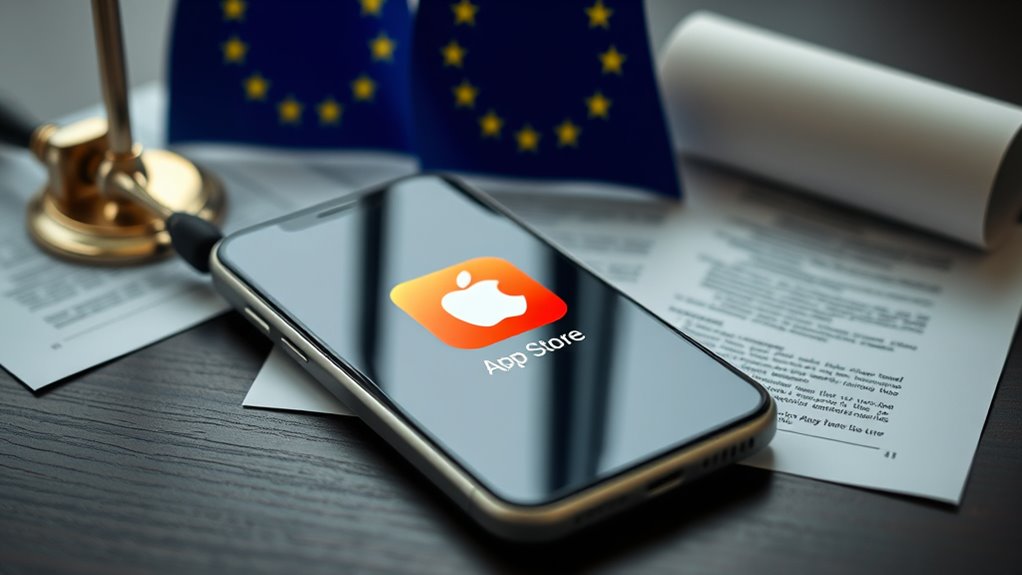European regulators have filed a fresh antitrust complaint against Apple, accusing the company of restricting fair competition through its App Store policies. They focus on how Apple limits developers’ options for in-app purchases and forces them to use Apple’s payment system, often taking high commissions. This may also limit consumer choices and inflate prices. To see how these issues might affect you and the broader market, keep exploring the details.
Key Takeaways
- European regulators filed a new antitrust complaint against Apple over App Store policies.
- The focus is on restrictions related to in-app purchase methods and payment options.
- Concerns include Apple’s 30% commission and prohibitions on developers linking outside payment platforms.
- The complaint aims to assess if these practices violate EU antitrust laws and limit competition.
- Ongoing investigations may lead to policy changes affecting Apple’s app monetization strategies.

Apple is once again under scrutiny in the European Union as regulators file a new antitrust complaint concerning the company’s App Store terms. This time, the focus centers on how Apple handles in-app purchases and the restrictions it places on developers. The EU’s concern is that Apple’s policies limit competition and unfairly control the way developers distribute their apps and monetize their offerings. You might find it frustrating that when you buy an app or make in-app purchases, Apple takes a cut, often up to 30%, which some see as excessive. But the issue goes beyond just fees; it’s about how Apple restricts developers from offering alternative payment options or communicating directly with their users outside the App Store.
Developers are constrained by Apple’s rules, which prevent them from directing users to outside platforms for payments. This means you, as a user, can only purchase in-app content through Apple’s system, which includes using Apple Pay or credit cards registered with your Apple ID. Apple’s restrictions also mean developers can’t inform you about cheaper or alternative ways to buy digital goods outside the app. This limits your choices and keeps Apple in a dominant position, which regulators argue stifles competition. From your perspective, it might seem like Apple is controlling every aspect of your purchase experience, leaving you with fewer options and potentially higher prices.
The complaint also highlights that these developer restrictions create a barrier for smaller app makers and new entrants. If developers want to avoid paying Apple’s commission or want to offer different payment methods, they face significant hurdles or risk being removed from the App Store. As a user, this could mean fewer innovative apps or features, as developers might be discouraged from trying to compete within Apple’s ecosystem. The restrictions on astrological compatibility and the influence of celestial alignments are unrelated but serve as an analogy for how external factors can impact perceptions and choices in digital transactions. The EU regulators believe that such restrictions violate antitrust laws because they prevent fair competition and harm consumers by keeping prices high and options limited.
Apple argues that its policies are necessary for security and quality control. However, critics, including the European regulators, see this as a way to maintain a monopoly over digital transactions within the iOS environment. For you, this ongoing conflict could lead to changes in how apps and in-app purchases are managed in the future, possibly offering more flexibility or alternative payment options. Until then, you’ll continue to experience the effects of these restrictions whenever you make purchases within your favorite apps, aware that larger regulatory bodies are scrutinizing whether Apple’s policies are fair or monopolistic.
Frequently Asked Questions
How Might This Complaint Impact Iphone Users?
This complaint might lead to changes that improve your iPhone experience, possibly offering more app choices and better prices. You could see enhanced privacy protections if Apple adjusts its policies, easing privacy concerns. However, it might also cause some disruptions or delays in app updates, affecting your user experience. Overall, these changes aim to balance innovation with consumer rights, ultimately benefiting your privacy and usability.
What Are Apple’s Main Defenses Against the Complaint?
You might think Apple’s defenses are flimsy, but it actually argues that its app store restrictions safeguard user security and privacy. They claim their strict developer negotiations ensure quality and safety, not monopolistic control. By emphasizing security measures and user experience, Apple counters claims of anti-competition, asserting that their policies benefit everyone. Ironically, they say they’re protecting consumers, even as critics argue their app store rules stifle innovation.
Could This Lead to Changes in App Store Pricing?
This complaint could lead to changes in app store pricing, as new store policies may be introduced to promote fair competition. You might see more transparent app pricing, with lower fees or different commission structures. Apple could be forced to modify its app pricing strategies to comply with EU regulations, potentially benefiting developers and consumers by creating a more competitive environment and offering better value through revised store policies.
Will Other Companies Face Similar Antitrust Issues?
In the landscape of digital giants, other companies with market dominance might soon find regulatory challenges closing in like storm clouds. As authorities scrutinize practices, it’s likely they’ll face similar antitrust issues if they restrict fair competition. Just as Apple now navigates these turbulent waters, you should watch how regulators shape policies, potentially forcing reforms across the industry to keep the marketplace fair and open for innovation and consumers alike.
How Long Will the Investigation Process Take?
The investigation timeline for this case can vary, but you should expect legal proceedings to take several months or even years. Authorities typically conduct thorough reviews, gather evidence, and evaluate compliance before reaching a conclusion. You need to stay patient and informed, as delays are common in complex antitrust investigations. Ultimately, the length depends on how quickly the authorities can complete their assessment and decide on potential actions.
Conclusion
As this new complaint unfolds, you’ll wonder what changes Apple might be forced to make. Will they tighten their grip or adapt to the growing pressure? The outcome remains uncertain, leaving you on the edge of your seat. One thing’s clear—this story isn’t over yet, and the next chapter could reshape how you experience the App Store. Stay tuned, because the real surprises are just beginning.









